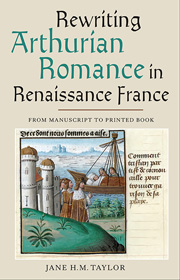Book contents
- Frontmatter
- Dedication
- Contents
- List of illustrations
- Acknowledgement
- Acknowledgements
- Abbreviations
- Introduction
- 1 Pierre sala, Poacher
- 2 ‘Books Printed Here’: The Business of the Print Shop
- 3 ‘A condition of survival’: Lancelot and Tristan
- 4 ‘Skimble-Skamble Stuff’: Meliadus, Merlin, Greaal
- 5 ‘Imperious Seductions’: Giglan and Perceval
- 6 ‘Satyric Scenes in Landscape style’: Amadis de Gaule
- 7 ‘Fruitlesse Historie’: Maugin's Tristan, Rigaud's Lancelot
- Afterword
- Appendix 1 Rough chronology of Publication
- Appendix 2 Sainct Greaal (1516) v. Vulgate Queste
- Appendix 3 Structure of the Roman de Giglan
- Bibliography
- Index
- Already Published
7 - ‘Fruitlesse Historie’: Maugin's Tristan, Rigaud's Lancelot
Published online by Cambridge University Press: 05 March 2014
- Frontmatter
- Dedication
- Contents
- List of illustrations
- Acknowledgement
- Acknowledgements
- Abbreviations
- Introduction
- 1 Pierre sala, Poacher
- 2 ‘Books Printed Here’: The Business of the Print Shop
- 3 ‘A condition of survival’: Lancelot and Tristan
- 4 ‘Skimble-Skamble Stuff’: Meliadus, Merlin, Greaal
- 5 ‘Imperious Seductions’: Giglan and Perceval
- 6 ‘Satyric Scenes in Landscape style’: Amadis de Gaule
- 7 ‘Fruitlesse Historie’: Maugin's Tristan, Rigaud's Lancelot
- Afterword
- Appendix 1 Rough chronology of Publication
- Appendix 2 Sainct Greaal (1516) v. Vulgate Queste
- Appendix 3 Structure of the Roman de Giglan
- Bibliography
- Index
- Already Published
Summary
The fruitlesse Historié of king Arthur and his round table Knights […] utterly without either grave precept or good example.
Les vieux romans dont nous voyons encore les fragments par ci par là, à sçavoir de Lancelot du Lac, de Perceforest, Tristan, Giron le Courtois et autres, font foy de cette vanité antique. On s'en est repeu l'espace de plus de cinq cens ans, jusques à ce que nostre langage devenu plus orné, et nos esprits plus fretillans, il a fallu inventer quelque nouveauté pour les esgayer. Voilà comment les livres d'Amadis sont venus en évidence parmi nous en ce dernier siècle.
[The old romances, fragments of which we still sometimes see – Lancelot du Lac, Perceforest, Tristan, Guiron le Courtois and others – are evidence of such antique frivolities. They were enjoyed for some five hundred years until, with our language becoming more ornate and our spirits more emotional, we had to invent some other novelty to amuse them. That is how the Amadis books have come to such prominence in this present century.]
François de La Noue was a hardened veteran known – for his artificial arm – as ‘Bras-de-Fer’; he was the author of austere Discours politiques et militaires, written in captivity and first published in Switzerland in 1587.
- Type
- Chapter
- Information
- Rewriting Arthurian Romance in Renaissance FrancePublishing from Manuscript to Book, pp. 183 - 214Publisher: Boydell & BrewerPrint publication year: 2014



